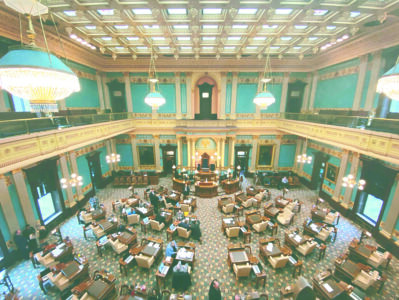24% Michigan marijuana tax, a key piece of the legislative budget deal, has passed
LANSING — After much hand wringing and consternation from lawmakers who feared detrimental effects to Michigan’s cannabis industry, the Michigan Senate voted early Friday morning by a thin margin to pass a 24% wholesale tax on marijuana products sold in the state.
The measure is estimated to raise $420 million in new revenue to fund road repairs and construction in the new fiscal year, a key component of the budget deal reached by Gov. Gretchen Whitmer, House Speaker Matt Hall (R-Richland Township) and Senate Majority Leader Winnie Brinks (D-Grand Rapids).
If the vote had failed, the entire deal would more than likely fall apart, sending the respective chambers and the governor’s office back to the negotiating table. Such a development would have also sent the state into a full government shutdown. House leadership said Thursday that it would not entertain another continuation budget after the one passed Wednesday expired after Oct. 8.
Although many members of the cannabis industry rallied at the Capitol and lobbied lawmakers against passing the legislation, the implications of the entire deal falling through weighed heavily on the Legislature’s mind.
The House and Senate on late Thursday and early Friday morning passed their respective conference budgets to fund the whole of government, K-12 schools and higher education, but all of that hinged on passage of the marijuana tax.
The bill passed by a slim 19-17 vote, which had nearly as much bipartisan dissent as it did support.
Brinks and the following senators voted in favor of the bill: Sarah Anthony (D-Lansing), Rosemary Bayer (D-West Bloomfield), Darrin Camilleri (D-Trenton), Mary Cavanagh (D-Redford Township), Stephanie Chang (D-Detroit), John Cherry (D-Flint), Kevin Daley (R-Lum), Erika Geiss (D-Taylor), Veronica Klinefelt (D-Eastpointe), Dan Lauwers (R-Brockway), Ed McBroom (R-Vulcan), Sean McCann (D-Kalamazoo), Mallory McMorrow (D-Royal Oak), Jeremy Moss (D-Bloomfield Township), Dayna Polehanki (D-Livonia), Sam Singh (D-East Lansing), Roger Victory (R-Georgetown Township) and Paul Wojno (D-Warren).
Sen. Jeff Irwin (D-Ann Arbor) voted no against the bill. He was one of the legislation’s strongest opponents.
Irwin was joined by Sens. Thomas Albert (R-Lowell), Joseph Bellino (R-Monroe), Jon Bumstead (R-North Muskegon), John Damoose (R-Harbor Springs), Roger Hauck (R-Mount Pleasant), Kevin Hertel (D-Saint Clair Shores), Michele Hoitenga (R-Manton), Mark Huizenga (R-Walker), Ruth Johnson (R-Groveland Township), Jonathan Lindsey (R-Coldwater), Senate Minority Leader Aric Nesbitt (R-Porter Township), Jim Runestad (R-White Lake), Sylvia Santana (D-Detroit), Sue Shink (D-Northfield Township), Lana Theis (R-Brighton) and Michael Webber (R-Rochester Hills).
A large portion of the day was spent debating the measure in caucus meetings and whipping votes to ensure the tax did not go up in smoke.
Brinks and Hall were repeatedly seen in the Capitol meeting on the chamber floors and entering offices to discuss the status behind closed doors. Whitmer also called groups of lawmakers into her Capitol office at multiple points throughout the afternoon and evening on Thursday.
One of those lawmakers was Chang, who on Tuesday put forward an amendment to the marijuana tax that would have brought the rate down to 20%, with the caveat of a tie-bar to the senator’s proposed nicotine products and e-cigarettes tax. Chang surmised that the amendment would not be taken up in an interview with Michigan Advance.
When she left Whitmer’s office on Thursday evening, she was asked if she and the governor had discussed her proposal. Chang said that they had.
As to whether the proposal was likely a new vehicle for what appeared to be a flailing 24% rate, Chang would not comment on how the Senate planned to vote. She also said then that she was undecided on the 24% tax.

